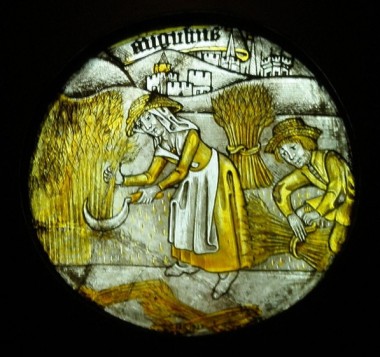ON THE NUMBER OF SINS
“Because sentence is not speedily pronounced against the evil,
the children of men commit evil without fear.”
cf Ecclesiastes 8:11
If God instantly chastised the man who insults him, we certainly should not see him so much outraged as we do at present. But because the Lord does not instantly punish sinners, but waits for them, they are encouraged to offend him the more. It is necessary to understand that, though God waits and bears, he does not wait and bear forever. It is the opinion of many holy fathers–of St. Basil, St. Jerome, St. Ambrose, St. Cyril of Alexandria, St. John Chrysostom, St. Augustine, and others–that as God (according to the words of Scripture, Wisdom 11:21: “Thou hast ordered all things in measure, and number, and weight.”) has fixed for each the number of his days, the degrees of health and talent which he will give to him, so he has also determined the number of sins which he will pardon; and when this number is completed, he will pardon no more. “Illud sentire nos convenit,” says St. Augustine, “tamdiu unumquemque a Dei patientia sustineri, quo consummato, nulam illi veniam reservari” (De Vita Christi, chapter 9). Eusebius of Caesarea says the same–“Deus expectat usque ad certumn numerum, et postea deserit” (Lib 8, Chapter 2). The same doctrine is taught by the above-mentioned fathers.
And these fathers have not spoken at random, but resting on the sacred Scriptures. In one place the Lord says that he restrained his vengeance against the Amorites, because the numbers of their sins was not as yet filled up. “For as yet the iniquities of the Amorites are not at the full” (Genesis 15:16). In another place he says, “I will not add anymore to have mercy on the house of Israel” (cf Hosea 1:6). Again he says “All the men who have tempted  me ten times…shall not see the land” (Numbers 14:22, 23). “Thou hast,” says Job, “sealed up my offenses as it were in a bag” (Job 14:17). Sinners keep no account of their sins; but God keeps an account of them, that when the harvest is ripe–that is, when the number of sins is completed–he may take vengeance on them. “Put ye in the sickles; for the harvest is ripe” (Joel 3:13 [4:13 NAB]). In another place he says, “Be not without fear about sin forgiven, and add not sin to sin” (Sirach 5:5). As if he said, O sinner! You must tremble even on account of the sins which I have forgiven you; for if you add another, it may happen that this new sin, along with those which have been pardoned, may complete the number, and then there shall be no more mercy for you. “The Lord waiteth patiently, that, when the day of judgment shall come, he may punish them in the fullness of their sins” (2 Maccabees 6:14). God waits till the measure of iniquities is filled up, and then he chastises the sinner.
me ten times…shall not see the land” (Numbers 14:22, 23). “Thou hast,” says Job, “sealed up my offenses as it were in a bag” (Job 14:17). Sinners keep no account of their sins; but God keeps an account of them, that when the harvest is ripe–that is, when the number of sins is completed–he may take vengeance on them. “Put ye in the sickles; for the harvest is ripe” (Joel 3:13 [4:13 NAB]). In another place he says, “Be not without fear about sin forgiven, and add not sin to sin” (Sirach 5:5). As if he said, O sinner! You must tremble even on account of the sins which I have forgiven you; for if you add another, it may happen that this new sin, along with those which have been pardoned, may complete the number, and then there shall be no more mercy for you. “The Lord waiteth patiently, that, when the day of judgment shall come, he may punish them in the fullness of their sins” (2 Maccabees 6:14). God waits till the measure of iniquities is filled up, and then he chastises the sinner.
Of such chastisements there are many examples in the Scriptures. Saul disobeyed God a second time, and was abandoned. When he entreated Samuel to intercede for him saying, “Bear, I beseech thee, my sin and return with me that I may adore the Lord” (cf 1 Samuel 15:25), Samuel answered, “I will not return with thee, because thou hast rejected the word of the Lord, and the Lord hath rejected thee” (cf 1 Samuel 15:26). We have also the example of Belshazzar, who after having profaned the vessels of the temple at table, saw a hand writing on the wall, “Mene, Tekel, Peres.” Daniel came, and in explaining these words, among other things, said, “Thou art weighed in the balance, and art found wanting” (Daniel 5:27). By these words he gave the king to understand that in the balance of divine justice the weight of his sins had made the scale descend. “The same night, Belshazzar, the Chaldean king, was killed.” O how many miserable sinners meet with a similar fate! They live many years multiplying sins; but, when the number is filled up, they are struck dead, and cast into hell. “They spend their days in wealth, and in a moment they go down to hell” (Job 21:13). There are some who spend their time in investigating the number of years which each shall live. But who can discover the number of sins which God will pardon each individual? We should, therefore, tremble. My brother, it may be that God will pardon you no more after the first criminal pleasure which you indulge, after the first thought to which you consent, or after the first sin which you commit.
Affections and Prayers
Ah! My God, I thank thee. How many, for fewer sins than I have committed, are now in hell! For them there is no pardon–no hope. And I am still living; I am not in hell; but, if I wish, I can hope for pardon and for paradise. I am sorry above all things for all my sins, because by them I have offended thee, who art infinite goodness. Eternal Father, look on the face of thy Christ; behold thy Son dead on the cross for my sake; and through his merits have mercy on me. I wish to die rather than offend thee any more. When I consider the sins I have committed, and the graces thou hast bestowed on me, I have just reason to fear that, if I commit another sin, the measure shall be completed, and that I shall be damned. Ah! Assist me by thy grace; from thee I hope for light and strength to be faithful to thee. And if thou seest that I should again offend thee, take me out of my life, now that I hope to be in a state of grace. My God, I love thee above all things, and I feel a greater fear of incurring thy enmity than of death. For thy mercy’s sake do not permit me ever more to become thy enemy. Mary, my mother, have pity on me; assist me; obtain for me holy perseverance.
Editor’s Note: This meditation is from St. Alphonsus Liguori’s “Preparation for Death” (1758).
Art: Labours of the Months (August-Harvest) Stained Glass Panel, 1450-1475, Photographed February 2010 by David Jackson, CC-SA, Wikimedia Commons.




